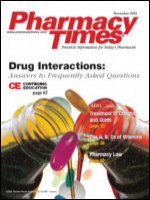Publication
Article
Pharmacy Times
Drug Diversion in the Health Facility
Author(s):
Drug diversion in America?s health facilities is a common fact, little known to the general public. There are several facets to this kind of diversion, but the health profession most commonly involved in this activity is nursing. Nurses represent the largest group of health professionals in any state, and they have easy access to prescription medication. Significant diversion also occurs in the operating room and in pharmacies.
When I retired from the Cincinnati Police Pharmaceutical Diversion Squad in 1999, my investigators were arresting a health professional about every 6 days. Approximately 70% of those were nurses diverting medications from hospitals, nursing homes, and home health care sites. I knew that these arrests represented only a fraction of the health facility diversion problem, since many of the arrests were of people from the same facilities. This meant that the majority of health facilities were not reporting prescription drug thefts.
I feel strongly that all health facilities experience prescription drug diversion. The size of the institution, the health professional population, and the seriousness of the administration in dealing with the problem will determine how frequent and how widespread the problem is.
Drug diversion is a serious crime that often impacts patients negatively, and when health facility administrators do not address the issue there is a severe impact on the addicted health professional as well. It can lead to the death of the health professional, and/or to extreme pain and suffering for future patients who encounter the impaired professional.
Too often, the addicted health professional who is caught diverting drugs is fired. The official reason given will likely not be diverting drugs, but other administrative infractions that seem to reduce the facility?s liability.
The Drug Enforcement Administration (DEA) mandate, however, is that any theft or significant loss of a controlled substance must be reported to the DEA. The DEA?s report also will ask whether the facility has reported the diversion to local law enforcement. Many states mirror this regulation and require reporting to their agency as well. Administrative and/or criminal sanctions may be imposed for the failure to report these losses.
An operating room nurse we encountered at a Cincinnati hospital had recently moved to the area from Tennessee. She was caught substituting narcotics for other substances by another nurse working in the facility. When we interviewed her and told her that she was going to be arrested, she was very indignant. She could not understand why, when she was caught twice in Tennessee, she was simply let go by the hospital, whereas we insisted on turning her over to the justice system.
We explained to her that, had the Tennessee hospital authorities done their job, she would not be in Ohio causing pain and suffering for patients. She also might have started a meaningful rehabilitation instead of perpetuating an already growing addiction. Her addiction would be even harder to address than it would have been years earlier in Tennessee.
Usually the major reason why health facilities do not report drug diversion is the fear of publicity. No one likes bad publicity, and in business it can also mean a reduction in revenue or the fear of civil reprisals on behalf of patients. The sad fact is that some health facility administrators are willing to compromise patient safety in the pursuit of the dollar.
The other important issue is that the health facility pharmacist is often among the first persons to recognize or be notified of these diversions. Most pharmacists are very diligent about reporting these offenses, but upper administrators, or even corporate lawyers, may stand in the way. This creates a huge dilemma for the pharmacist.
These decisions may not always be easy, but it is important that pharmacists, or anyone who becomes aware of these crimes, report them to the proper authorities. Doing so is the only way to properly address and reduce the problem of drug diversion in the health facility.
John Burke, director of the Warren County, Ohio, drug task force and retired commander of the Cincinnati Police Pharmaceutical Diversion Squad, is a 32-year veteran of law enforcement.For information, he can be reached by e-mail at [email protected], by phone at 513-336-0070, or via the Web site www. rxdiversion.com.







